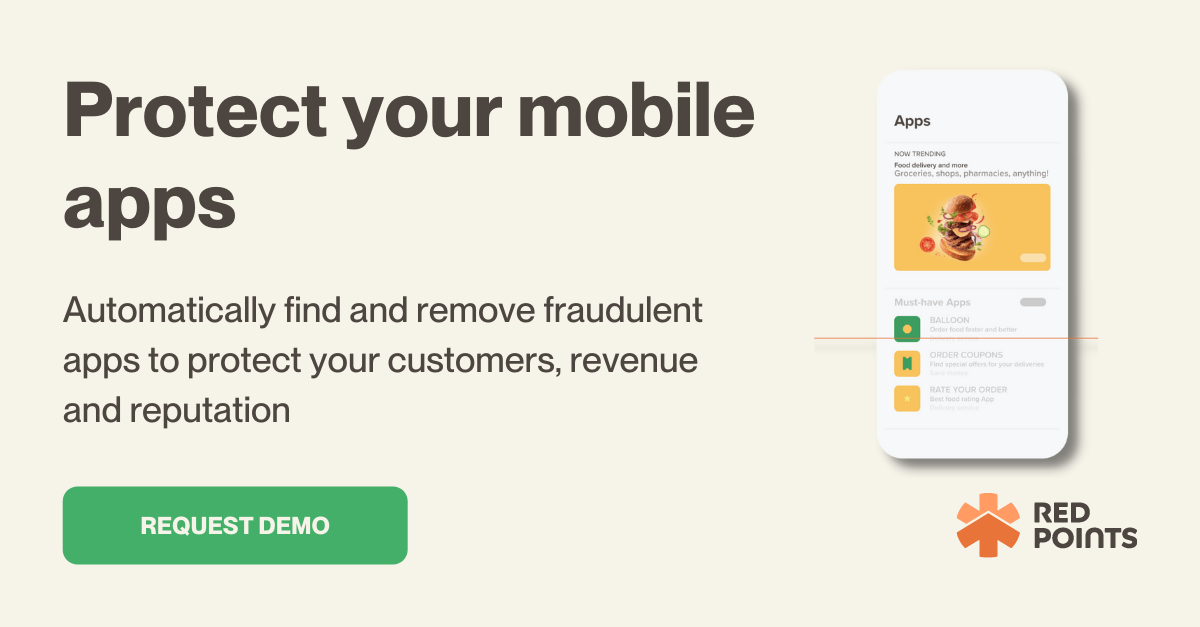As the world becomes increasingly digital, the use of mobile apps has exploded in popularity and usage.
While app stores like Apple’s App Store and the Google Play store offer a controlled environment for app distribution, the rise of iOS third-party stores presents a potential threat to software brands and businesses.
The recent news that Apple will allow iOS third-party stores on their products as a result of recent regulatory changes in the European Union raises concerns about the consequences of unregulated app distribution.
That’s why more than ever businesses should consider the risks of piracy, data breaches, negative user experiences, and legal consequences that can arise from unregulated app stores.
In this guide, we will explore the possible dangers third-party stores can pose to mobile app businesses and how Red Points can prevent app piracy.
What are third-party app stores?
Third-party app stores are platforms that offer mobile applications for download and installation on smartphones and other devices.
Unlike official app stores, such as Apple’s App Store and Google Play, third-party app stores are not managed or controlled by the device’s manufacturers or operating system developers.
These stores can provide users with access to apps that may not be available in official app stores, such as modified or pirated versions of popular apps.
While some third-party app stores are legitimate, many are not and can pose significant risks to their users.

Does Apple allow third-party app stores?
In recent years, there has been a surge in the number of third-party app stores, particularly for Android devices. However, Apple strictly prohibits third-party app stores on all its products, including iPhones and iPads.
Apple’s App Store monopoly is well known and has been hotly contested in recent years. But the company insists the policy exists to ensure the safety and security of their devices and prevent unauthorized access to sensitive user data.
For example, in the 2021 suit filed against Apple by Epic Games over Fortnite microtransactions, Apple defended its monopoly over its app stores by claiming ‘‘Sideloading for iOS would create unacceptable vulnerabilities from Apple’s perspective”.
However, due to recent EU laws, specifically The Digital Markets Act, the tech giant will have no choice but to allow third-party stores access to Apple products if it wants to keep operating in the European Union (, and this is one of the rumored iOS 17 updates).
This raises concern about the potential consequences of unregulated app distribution on iOS devices.
Businesses that rely on mobile apps to reach customers must pay attention to the risks posed by third-party app stores. While third-party stores may provide access to a wider range of apps and features, they can also present significant threats to both users and businesses.
By taking proactive measures to address the consequences of third-party app stores, businesses can prevent app piracy and maintain the trust of their customers in the digital age.
How do third-party app stores on Apple products impact businesses?
Third-party stores on Apple products will have a significant impact on mobile app businesses and the Apple ecosystem as a whole.
By allowing access to apps and content that may not be safe or legal, these stores could put businesses that rely on their mobile apps at risk in terms of security, revenue loss, and brand damage. The potential consequences include :
Increased risk of piracy
One of the most significant impacts is the increased risk of piracy. With unregulated app stores on iOS devices, there is a greater likelihood that pirated versions of apps will be available for download. Pirated apps can lead to revenue loss, brand damage, and legal repercussions for businesses.
Additionally, pirated versions of mobile apps can cause confusion among customers and damage the reputation of a brand.
Increased malware and security risks
A huge appeal of the App Store is its security. Apple ensures any app in the App Store has been thoroughly vetted and scanned for any spyware or malware. Apple also ensures that app developers continually update their products with the latest security measures, or they risk removal.
Unregulated app stores may offer apps that have not been vetted or approved by Apple, leading to potential security threats for both users and businesses.
Malicious apps downloaded from these stores can infect users’ devices with malware, leading to data breaches, identity theft, and other security risks.
This could lead to data breaches and privacy violations.
User experience
Apps that are not approved by Apple may not function properly on iOS devices, or offer the same level of user experience as apps from the ios app store. More worryingly, third-party stores may offer illegally modified versions of your app.
These illegally modified iOS App Store packages (or mod IPA) can contain malicious code designed to steal user data. Also, since they have been modified, the user experience is no longer under your control. Hence, the modified apps can experience unexpected crashes and other issues that affect user experience.
This can lead to frustrated users and dissatisfied customers who might leave potentially damaging reviews. This can inadvertently harm your business’s reputation and result in lost revenue.
To protect their mobile apps from the risks associated with third-party app stores, businesses must take proactive measures to monitor and detect instances of app piracy or impersonation when it comes to their mobile apps.
By taking proactive measures to protect their apps from the risks associated with third-party app stores, businesses can stay ahead and protect themselves from malicious actors.
Are third-party app stores safe?
Third-party app stores are generally considered less safe than official app stores like Apple’s App Store or Google Play.
This is because third-party app stores are not subject to the same level of scrutiny, vetting, and oversight as official app stores. As a result, apps available on third-party stores may not have been thoroughly tested for security vulnerabilities or malware infections, which can pose a significant risk to users’ personal information and sensitive data.
Additionally, some third-party app stores may contain pirated or modified versions of popular apps, which can lead to legal and financial repercussions for both users and developers. Pirated apps can also contain malicious code that can compromise user security and privacy, and they may also lead to revenue loss for developers if left unchecked.
In addition to the risks of piracy and malware, third-party app stores may also contain repackaging attacks or low-quality clones of popular apps.
Repackaging attacks involve malicious actors taking legitimate apps and modifying them to include malware or other malicious code, which can be used to steal user data or compromise device security.
Low-quality clones, on the other hand, are often poorly designed and may not function properly, leading to negative user experiences. These are often designed simply with the intent of fooling customers in paying a rate for the app which may be slightly more discounted than the genuine app. By the time the user realizes the app is a low-quality copy they’ve already transferred funds over to the bad actor behind the scam.
These repackaging attacks and low-quality clones can be particularly damaging for businesses that rely on mobile apps to reach their customers.
While some third-party app stores may be a vehicle for malicious actors to distribute fraudulent apps, legitimate third-party app stores offer a useful service to users and can be quite helpful.
Business owners looking to expand their reach can consider establishing their presence in these third-party app stores. An example is Setapp, which offers a subscription-based service for users to access apps on macOS.
By having their app hosted on legitimate third-party stores, businesses can maximize the visibility of their app without concern over safety, allowing customers from all over the world to have access.
However, businesses should always be vigilant when deciding which app stores they want their apps to appear in and conduct due diligence on the app stores’ policies and procedures. Bad actors may be quick to impersonate your app and attempt to scam your potential customers if you add your app to an unregulated app store.
Are third-party stores regulated?
Third-party app stores are usually not regulated in the same way as official app stores like Apple’s App Store or Google Play. While some may have their own set of guidelines and policies, these are often not enforced or monitored in the same way that Apple’s App Store and Google Play are.
Despite this, certain third-party app stores are subject to (and adhere to) industry and consumer regulations, such as consumer data protection laws. A good example of a regulated app store is the Amazon Appstore, which is compliant with government regulations and consumer privacy laws.
Businesses must evaluate all platforms they consider using to ensure they’re comfortable with their policies and practices.
Additionally, businesses should take extra steps to protect themselves from the risks associated with unregulated third-party app stores. This includes implementing anti-piracy services to monitor instances of piracy and take action to remove pirated content whenever necessary.
How can brands monitor app piracy on third-party app stores?
Monitoring app piracy on third-party app stores can be a complex and ongoing process, but there are several strategies that brands can use to protect their apps and intellectual property.
Use an effective anti-piracy service
An effective anti-piracy service can help businesses protect their apps and intellectual property from the risks associated with unregulated third-party app stores.
With such a service, businesses can monitor for instances of piracy in these stores, and take action immediately when needed.
Red Points Mobile App Protection software is an example of such a service. Using AI bots powered by machine learning tech, the software program can quickly detect illegally pirated copies of your app online and take down infringing content immediately.
With this in place, you can ensure your applications are safe from illegal use and protect your intellectual property.
What’s next
In the wake of recent regulations, businesses should be aware of the potential risks associated with third-party app stores and take steps to protect their content and apps from unauthorized use.
While it might be worth establishing a presence in some trustworthy third-party app stores, businesses must be wary of the possibility of illegally modified versions of their apps being distributed by less regulated app stores.
By employing anti-piracy services and other proactive measures, such as Red Points’ Mobile App Protection Software, businesses can protect their intellectual property from being stolen or distributed without permission. This is essential for any business to remain competitive in today’s market.






